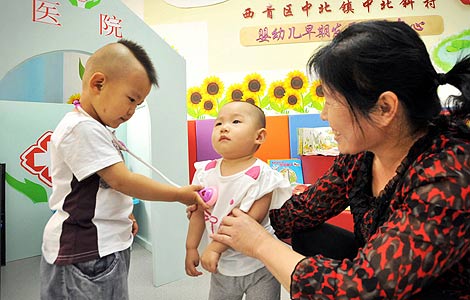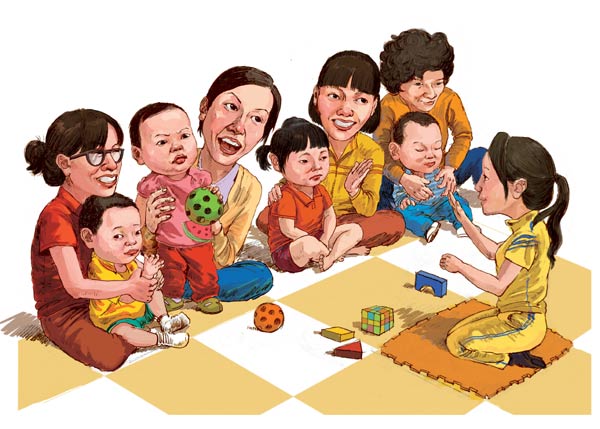Toddlers face early lesson in harsh realities of life
Updated: 2012-05-09 07:34
By He Na (China Daily)
|
||||||||
Children at a preschool education center in Tianjin realize that it’s never too early to take care of their health. Centers such as this are growing in popularity. YOU SIXING / XINHUA

Some parents believe it is never too soon to begin classroom education, reports He Na in Beijing.
Momo waited outside the classroom for her music class to begin at the Beijing Century Center. It was difficult to discern how she felt because her face was expressionless. Several other students were also waiting. All wore the same expression, but there was almost no communication between them.
"Hello, hello, how are you doing today, my dear?" asked the teacher, Vivica Wu, as she enthusiastically greeted her charges. Only two of the students raised their heads a little, while the others appeared not to have noticed the teacher at all.
Perhaps feeling that their children's behavior was a little impolite, most of the parents in attendance smiled at Wu.
However, the teacher wasn't in the least upset or surprised at the indifference shown by her students. Wu does not expect too much from her students, because most of them can't speak and some can't even stand on their own.
What do you expect to find in a student's bag? Books, homework notes, pens perhaps. But Wu's students carry none of the above. Instead they have nursing bottles, milk powder, water, cookies, snacks, handkerchiefs and diapers. They are China's youngest students, all of them younger than 3 years old.
Momo can be classified as an "old student" at the preschool institute. She's been "studying" for more than six months, even though she's only 11 months old and needs to be held by her mother.
The class began as scheduled. There were seven students in Momo's class. The oldest was 15 months, the youngest only 10 months. The parents held their children and sat in a semicircle in front of the teacher, listening intently. But most of the kids were not in the mood for classes and some began to show signs of impatience.
One boy, called Lele, wanted to play on the slide. His mother tried to persuade him to pay attention to the teacher, but failed and so Lele spent the entire lesson on the slide.
Wu encouraged the children to beat a drum, but Momo appeared to be more interested in the cartoons that adorned the instrument. Then the teacher asked the parents to hold their children and dance with her in time with the music. Each parent held their child awkwardly and followed the teacher's moves.
"Although the class only lasted 45 minutes, it felt more like two hours. Not only did I have to pay attention to the teacher, who spoke in English, but I also had to hold Momo and so I'm really exhausted," said Zhang Yushu, Momo's mother.
Momo attends this preschool music class twice a week and also takes part in an entertainment class. Each lasts about 45 minutes, and costs 280 yuan ($44.50). Zhang paid for 96 classes in a lump sum and so received a discount, but the course still cost more than 17,000 yuan. "I really didn't want to enroll her, because she's far too young. But many children in our community attend these preschool institutes and I don't want her to be left behind," said Zhang.
 |
| SONG CHEN / FOR CHINA DAILY |
Problems and solutions
"The intense competition for enrollment in kindergartens and primary schools has made young parents extremely anxious about their child's future. An increasing number send their kids to various types of class, almost from the day they are born," said Zhang Yan, a professor at the School of Education at Beijing Normal University.
"Many preschool institutes just take advantage of the parents' concerns and exaggerate the role that these places play in preschool education. The number of these institutes has increased sharply over recent years, but there's no national data available," she said.
"So many people attach great importance to preschool education, but it's a burgeoning industry and a lack of oversight means that the good and bad are intermingled. The quality of teaching is hard to guarantee," said Yuan Ailing, a professor at the School of Educational Science at South China Normal University in Guangdong province.
Many parents believe that these institutes should be registered with the Ministry of Education. Wang Chunying, an official from the Shandong province education bureau, said the department regularly receives complaints about preschool institutes, but as the schools are not registered, the department has no way of dealing with the problem. "Currently, preschool institutes are mostly registered with the local departments for industry and commerce," she said.
"As long as they pay their taxes promptly, no one bothers to oversee them," said Yuan.
Qualifications shortfall
"Preschool education for children aged between 3 and 6 years old is part of the government's education program, but there is nothing for children younger than 3. The larger institutes employ graduate teachers who have kindergarten experience, but the smaller schools can't attract qualified staff and so they employ people who have only received around 20 days of training," said Yuan.
"I think it's very useful for kids to attend early education classes, but you must choose a good school. My son is 3 now and the teacher says he performs much better than his peers. He attended Gymboree, a large preschool institute, for more than a year" said Wang Meng, a 34-year-old mother who works for a foreign company in Beijing.
"Another boy in his class also attended preschool classes, and he too performs well. So the teacher said that in her view, preschool classes really do have a function. Although it costs a lot, as long as the family can afford it, it's a good thing to do," she said.
"We still don't have a national standard for preschool education institutes, with specific rules on teachers' qualification, teaching materials, aids and goals, so it's hard to guarantee the quality of teaching," Yuan said.
High fees
Most of the classes last for 40 minutes to an hour and cost about 200 yuan. Many parents are unsure whether the classes are useful and will have a positive outcome, but they like to believe they will.
"The lack of a uniform charging standard means that these institutes often choose to locate themselves in prestigious business centers, where rents are high. Most don't develop the courses themselves, but pay to join a franchise, which requires a high initial fee. All of these costs are passed on to the parents. The institutes charge too much and the cost is often higher than that for university study," said Yuan.
National standards urged
Preschool education is not just the preserve of the wealthy, but the high fees have deprived the majority of children. "In Nanjing, the capital of Jiangsu province, the local government cooperated with preschool institutes, through tax breaks and reduced venue costs, to lower the fees and allow more kids to receive early education. That sort of cooperation should be promoted in more areas," she said.
Yuan also suggested that the government should invest more money and open more preschool institutes to provide easier access for kids from regular families. It should also organize more public lectures in communities and factories to promote the concept.
There is an urgent need to draw up a national standard for preschool institutes to clarify the issues of safety, the teaching environment and profit margins and set specific demands for teachers and other staff, she added.
"The government should put 0 to 3 preschool education into a national medium- and long-term educational reform and development plan and establish greater supervision of the industry," said Cheng Zhun, a member of the Chinese Family Education Association.
"Scientific research shows that preschool education influences the development of children's brains. It needs to be carried out as early as possible, but it doesn't mean that we must send the children to classes," said Beijing Normal University's Zhang Yan.
Solving the problem could include the use of preschool educational resources to allow parents to become the main educators. The family, not the school, is the best educational institute in the world, she added.
"We often say a good mother is better than a good teacher, the lessons that kids learn through daily life and communication with their parents and family members are often more useful than those learned in preschool institutes. How to dress themselves, wash their hands, tie shoelaces, use a spoon these are also lessons they must learn," Zhang said.
"Young parents are far too anxious about their kids' development and futures, but it's really not necessary," said Liu Yan, a professor of preschool education at Beijing Normal University. "Let's provide kids with a relaxed and pleasant childhood, instead."
Contact the reporter at hena@chinadaily.com.cn

 Relief reaches isolated village
Relief reaches isolated village
 Rainfall poses new threats to quake-hit region
Rainfall poses new threats to quake-hit region
 Funerals begin for Boston bombing victims
Funerals begin for Boston bombing victims
 Quake takeaway from China's Air Force
Quake takeaway from China's Air Force
 Obama celebrates young inventors at science fair
Obama celebrates young inventors at science fair
 Earth Day marked around the world
Earth Day marked around the world
 Volunteer team helping students find sense of normalcy
Volunteer team helping students find sense of normalcy
 Ethnic groups quick to join rescue efforts
Ethnic groups quick to join rescue efforts
Most Viewed
Editor's Picks

|

|

|

|

|

|
Today's Top News
Health new priority for quake zone
Xi meets US top military officer
Japan's boats driven out of Diaoyu
China mulls online shopping legislation
Bird flu death toll rises to 22
Putin appoints new ambassador to China
Japanese ships blocked from Diaoyu Islands
Inspired by Guan, more Chinese pick up golf
US Weekly

|

|






